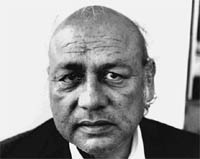|
Poetry of revoltAmarjit Chandan recollects his conversations with noted Urdu poet Habib Jalib
The Tribune: December 14, 2008 Habib Jalibís poetry, along with that of Faiz, was invoked in the recent pro-democracy agitation in Pakistan. He visited London twice ó first in the summer of 1988 when his collected works were launched. He was in his element and enthralled his admirers with his poetry sung in style both in private and public gatherings. Four years later, he visited again. He was suffering from what turned out to be his terminal ailment. He was under intensive treatment for various ailments in Cromwell Hospital and then moved to a hospice before returning to Lahore, where he died a few months later.
BORN in 1928, Habib Jalib was 12 when he left his ancestral village Miani Afghana in Hoshiarpur district. His first hijrat (migration) was to Delhi with his father in search of work. After six years he started his second hijrat of his own will to Pakistan. After reaching Lahore from Karachi in 1956, he started moving in the progressive literary circles. A process of disillusionment with the ideology of Pakistan had just begun. His first collection of Urdu poems, published in 1957, was aptly titled Barge-e-Awara (The Rootless Leaf). After that he published nine collections, the last one being a deluxe edition of his collected poetry Harf-e-sar-e-dar (The Word at the Gallows) published by Urdu Markaz London ó a subsidiary of the Bank of Credit and Commerce International. He asserts that his personality, poetry and politics are one: "I havenít spent my life in a basement or on an island. Itís in my character to be on the side of the people". He names poets of Pakistan and India "who got frightened, forgot Prem Chand and became stooges of the establishment". He drops the names of Ahmad Nadeem Qasmi and Ali Sardar Jafri time and again. Iíve heard the noise of flowing blood from far away But those who were close didnít hear it. "Iím the last poet in the anti-establishment tradition", he says while humming one of his couplets: Everybody else has forgotten to write the word of truth Now itís left to me to write of revolt. Jalib was a self-made man. He liked to call himself an ummi (illiterate) socialist, as Hazrat Mohammad is known as the ummi Prophet. Jalib couldnít afford to have higher education, nor did he have the guidance of any ust?d (master) poet in the Indian poetic tradition. "I donít know really how I could write", he said. Jalib has written not more than 20 poems in his mothertongue, Punjabi. He prefers to talk in Urdu: "I left my village in my early childhood. After that where ever I went Urdu dominated the scene". He claimed that he could control huge gatherings with his poems. During the Ayub regime he contested the elections on the National Awami Party ticket and lost: "People like my poetry not my political links". I ask the master of agitprop whatís the literary value of his popular poetry and that would it last long? He quips: "You can see that Nazeer Akbarabadi has risen from his grave". Is being progressive compatible with using the ghazal, a poetic form regarded by some as typical of feudal decadent values? This was the question faced by the progressive poets of new Pakistan. While the reactionaries advocated the ghazal form, the progressives defended nazm. The division seemed sharp and clear. But there soon followed the age of peaceful co-existence. But Jalib this is what said about ghazal: "Yes, one should write in this form. Ghalib wrote ghazal. So did Mir. The tradition of revolt started. Jafar Zattali was hanged. After that Hasrat Moh?ni and Faiz carried the tradition forward". He talked of freedom, justice and democracy. "For me aesthetics is supreme. Hafiz was a man of royalty, but heís a great poet. So were Khusro ond Ghalib. Mir Mussafi is like a brother to me. Faiz wrote ghazals. They were all great poets. A great poet canít write against the people, whatever he may utter in public". Can Pakistan survive? This is a question that haunts most Pakistani intellectuals. The Pakistani leftists shy away from the question of two-nation theory ó the basis of the ideology of Pakistan. West Punjabis are oppressing other nationalities in the name of religion and Urdu. Itís a blessing they donít use their own language and culture. Jalib sounded the alarm: "Wake up my Punjab, or we lose Pakistan (Jaag mere Punjab ke Pakistan chalaa)". Why are Punjabis the custodians of Pakistan? Jalib contradicts himself: "If we had kept the Bengalis with us, there wouldnít be any army rule. Punjab has the responsibility, otherwise only Lahore would remain in Pakistan." But thatís not the answer. He comes with this face-saver: "The Sindhi leader G. M. Sayyed says: ĎWe want Zia, only he can break Pakistan.í Iím also for Zia-ul-Haq. He can do the job better. How can I say in public Ė Bravo Punjab, Pakistan is going. Zia is doing our job well". It was rumoured that Jalib would seek political asylum in England. His third hijrat? "No, not at all. I like the dirt of Pakistan. Iíll clean up all the things there. I love the police lock-ups of Lahore. I miss prison cells". What of his birthplace? He
has been there once after Partition. Nobody was willing to tell him who
killed his grandfather in the riots I donít ask him whether he
thinks of his birthplace in Punjabi or |
|||
